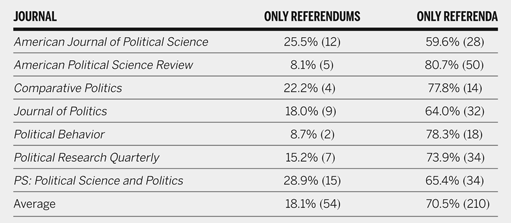The pluralization of referendum is a perpetual orthographic conundrum. Should we use referenda or referendums? Potentially, the plural in English of referendum could be either referendums or referenda. In practice, political science prefers referenda. We estimate that political scientists are three times as likely to use referenda than referendums (see table 1). In the journals we examined, seven of 10 articles chose to use referenda over referendums. In the field of journalism, the pattern is much different (see table 2), with the standard practice in major media outlets being to use only referendums. Journalism, it seems, has arrived at a different answer to this conundrum than has political science.
Table 1 Use of Referendums and Referenda in Political Science Journals, 1986–2006

Note. Number of articles in parentheses. Percentages indicate proportion of articles using either referendums or referenda; excluded percentages represent those articles that used both terms. Data based on a Boolean search of JSTOR archive.
Table 2 Use of Referendums and Referenda in News Outlets (2008–2009)

Note. Number of articles in parentheses. Percentages indicate proportion of articles using either referendums or referenda; excluded percentages represent those articles that used both terms. Data based on a Boolean search of LexisNexis online archive.
By choosing referendums over referenda, journalists (and a minority of scholars) are selecting a pluralization that is always correct. Referendum is derived from the Latin refero (“to bring back”). The use of referendum in modern politics originates with the Switzerland Confederation of the nineteenth century. The Swiss adopted referendum from ad referendum (“for bringing it back”), a phrase used when a delegate is sent to make decisions that are subject to the approval of a principle. In the early federal diets, delegates from the cantons were sent ad referendum, meaning that they needed the approval of the cantons for their decisions to be ratified (Adams and Cunningham Reference Adams and Cunningham1889; Oberholtzer Reference Oberholtzer1891).
As a term drawn from ad referendum, referendum is the gerund of refero (“to bring back”). As a gerund, referendum is best translated as “a referring.” The Latin gerund has no plural form. In pluralizing referendum, we are no longer using Latin but an anglicization, which should follow the rules of English pluralization. It is for this reason that some scholars advocate for referendums as the only proper choice (cf. Butler and Ranney Reference Butler and Ranney1978; Butler and Ranney Reference Butler and Ranney1994; DuVivier Reference DuVivier2007; Lacy and Niou Reference Lacy and Niou2000). Butler and Ranney, for example, quote a personal note from the editor of the Oxford English Dictionary (O.E.D.) reading, “by preferring Referendums as your title you have the angels of Rome and the O.E.D. on your side” (Reference Butler and Ranney1978, 5).
By choosing referenda over referendums, writers are using a hypercorrection, or a construction that mistakenly uses a grammatical rule in an effort to be correct. Hypercorrection often occurs when a speaker wants to use a rule that is commonly used by individuals with more power, education, or prestige. Writers who use referenda are employing hypercorrection by using a pluralization that follows a rule applied to similar words (e.g., agenda and memoranda) but is in fact incorrect, because the rule does not apply to gerunds. Even if a scholar chooses the term referendums, he or she may encounter a reviewer or editor who hypercorrects the author's grammar.
The hypercorrection stems, in part, from the possibility that referendum may also be the gerundive of refero. English (and many other modern languages) do not have this part of speech. In English, a gerundive is best translated as “the thing needing/fit to be done.” Referendum, then, would be “the thing to be referred.” Unlike the gerund, the gerundive in Latin can be pluralized (“the things needing/fit to be done”). The plural of the gerundive referendum is referenda. In this form, referendum is similar to agendum (“the thing to be done”), memorandum (“the thing to be called to mind”), and addendum (“the thing to be added”), which have as their plural forms agenda, memoranda, and addenda, respectively. Referenda would thus be the appropriate form for the gerundive referendum. By choosing referenda, most scholars are using a rule that is appropriate for gerundives and could even be applied to referendum in Latin.
Even though pluralizing referendum as referendums is always appropriate in English, one can make a case for the selective use of referenda. If chosen carefully, the plural of referendum could be used to signify the form of referendum being discussed. By using referenda (gerundive), one can signal that the grammatical subject is the issue being referred to the voters. One would then use referenda when discussing multiple referenda (gerundive) that are to be decided by voters during a single referendum (gerund). For example, in 2004, over two dozen states held referendums (gerund) on over one hundred referenda (gerundive). Scholars may still use referendums for both the gerund and gerundive forms, but the use of different plurals would clarify what was being discussed.






